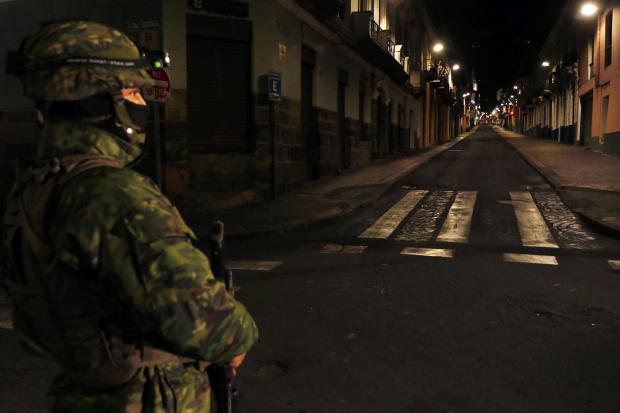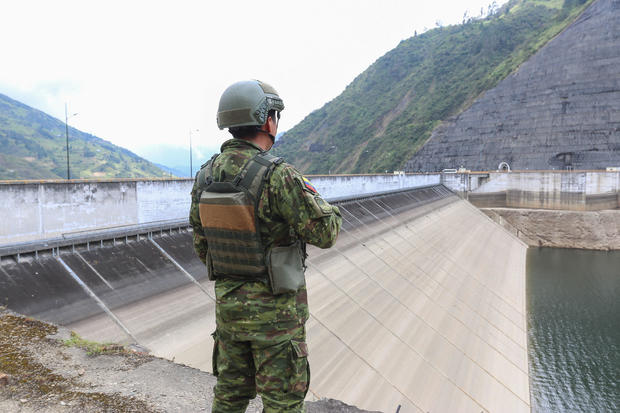Ecuador is facing an unprecedented energy crisis, forcing the government to impose nationwide nighttime blackouts in response to severe drought conditions that have significantly reduced hydroelectric power capacity. The situation poses not only an economic challenge but also raises significant security concerns as citizens grapple with the ramifications of these energy shortages.
Hydro Power Dependency and Drought Conditions
Ecuador relies heavily on hydroelectric power, which accounts for approximately 77% of its electricity generation. This dependence on hydroelectricity makes the country particularly vulnerable to climatic fluctuations. The current drought is reported to be the worst in 61 years, severely impacting water levels in reservoirs essential for hydroelectric generation.
The government, led by President Daniel Noboa, announced that from Monday to Thursday, the country would experience daily eight-hour power cuts from 10 p.m. to 6 a.m. This decision, while aimed at conserving energy, reflects the severe strain on the national power grid. The blackouts have already had significant repercussions on daily life, including disruptions to businesses and public services.
Immediate Government Responses
In an attempt to manage the crisis, the Ecuadorian government has undertaken several emergency measures. The nighttime blackout schedule was strategically chosen to minimize disruption to daytime activities. Additionally, public sector employees have been instructed to work remotely on specific days to further reduce energy demand. Despite these measures, many provinces experienced even earlier outages, highlighting the urgency of the situation.
The government’s actions also included a preventative maintenance operation on the national power grid, which resulted in a curfew across six provinces. This curfew was not merely an energy conservation measure but was also linked to heightened security concerns, as authorities sought to maintain public order amid the ongoing crisis.

Organized Crime and Security Concerns
The imposition of curfews and blackouts has also raised alarms about public safety, particularly about organized crime. During the curfew, security forces arrested 28 individuals linked to criminal activities, demonstrating that the energy crisis is intertwined with broader issues of governance and law enforcement.
Ecuador has seen an increase in organized crime in recent years, fueled by drug trafficking and other illicit activities. The disruption caused by the energy crisis has created an environment where criminal elements can exploit vulnerabilities. A heavy military and police presence has been reported in major cities, leading to the establishment of checkpoints aimed at deterring criminal activities. However, this increased security presence raises concerns about civil liberties and public trust in law enforcement.
The U.S. Embassy in Ecuador issued an alert warning American citizens to limit their movements during the blackouts, indicating a heightened risk of crime and civil unrest. Such alerts emphasize the international community’s recognition of the potential for instability as energy shortages persist.
Political Ramifications and Public Response
The energy crisis has significant political implications for President Noboa’s administration. In April, Noboa declared a state of emergency in the electricity sector and called for the resignation of the energy minister, suggesting that corruption and possible sabotage were contributing factors to the crisis. By taking these decisive actions, the government aims to regain public confidence, although the effectiveness of these measures remains to be seen.
Public sentiment regarding the government’s handling of the energy crisis is mixed. While some citizens support the measures to conserve energy, others express frustration over the frequency and duration of the blackouts. The government has implemented various strategies, including power rationing and the commissioning of a Turkish power generation barge, to mitigate the crisis. However, the long-term sustainability of these solutions is questionable.
Long-term Solutions and Infrastructure Challenges
Ecuador’s energy crisis is not a new phenomenon; it has been developing over several years, exacerbated by environmental factors and inadequate infrastructure. The country has faced energy shortages in the past, including blackouts caused by failures in transmission lines. The reliance on hydroelectric power, while environmentally sustainable, requires robust infrastructure and effective management to adapt to changing climatic conditions.
In the long term, Ecuador must diversify its energy portfolio to reduce vulnerability to droughts and other environmental challenges. This could include investing in renewable energy sources such as solar, wind, and geothermal power. A diversified energy strategy would not only enhance energy security but also contribute to economic stability and job creation in emerging industries.
International Considerations and Support
The energy crisis in Ecuador also raises questions about international support and cooperation. As the government seeks solutions, there is an opportunity for foreign investment and expertise to play a role in addressing the country’s energy challenges. Collaboration with international partners could facilitate technology transfer and capacity building in renewable energy sectors.
Moreover, international organizations and development banks could provide financial support for infrastructure improvements and renewable energy projects. Such investments would not only help alleviate the immediate energy crisis but also promote sustainable development and resilience to future challenges.
Ecuador’s ongoing energy crisis is a complex issue that intertwines environmental challenges, national security concerns, and governance dynamics. The government’s response, while necessary, reveals deeper vulnerabilities within the country’s infrastructure and public safety systems. As Ecuador navigates this multifaceted crisis, it will be essential for the government to adopt a comprehensive approach that prioritizes energy diversification, enhances security measures, and fosters public trust.
The implications of the energy crisis extend beyond immediate power shortages; they reflect broader themes of governance, public safety, and international cooperation. As the situation unfolds, it will be crucial for all stakeholders—government, civil society, and the international community—to collaborate in seeking sustainable solutions that ensure the resilience of Ecuador’s energy sector and the stability of its society.



